
We’ve all been there, you’re doing everything right, you’re watching your eating, exercising regularly, you’re even drinking more water. You walk into the bathroom to weigh, full of optimism, only to find you’ve gained weight… AGAIN! That’s when you think “Screw it, I’m going to Whataburger.” You probably wish you didn’t know what I’m talking about, but the odds are you do.
In almost 15 years in the fitness industry, I’ve seen more people derailed by this phenomenon than I care to remember. And who can blame them? When you’re working hard, making sacrifices, and staying disciplined, you expect to see results. And like any investment, if it’s not paying off, you stop investing.
But what if your lack of results was an illusion? What if HOW you were weighing was giving you a false outcome? What if you were seeing progress and the scale was lying to you? If you truly are doing the right things, the odds are overwhelming that you’re merely misusing your scale.
There is a better way to weigh, an approach that will provide you with much better data. Let’s clarify the problem and the solution.
THE PROBLEM – WEIGHING SPORADICALLY
The most common mistake people make is weighing themselves inconsistently. Most people weigh on random days. Like this:
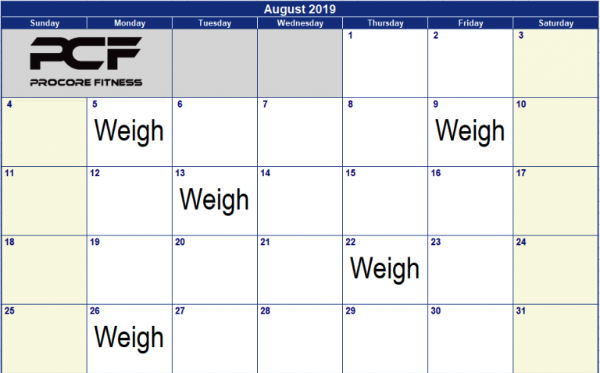
The problem with this approach is that it will likely give you a very unreliable reading. Here’s a chart of a professional female bodybuilders weight loss for competition over a 6-week time frame. Keep in mind this is someone who loses weight FOR A LIVING.
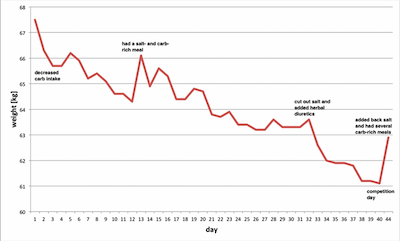
As you can see some days, her weight goes up, and other days it goes down.
Imagine if she weighed herself on random days like the 3rd and the 15th, as seen in the image below.
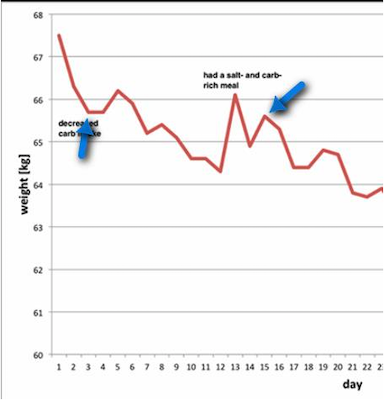
In this example, after tons of hard work, she would think she had only lost about 1 pound! As you can see, she’s actually on track and losing lots of weight, but if she weighed inconsistently like this, she would probably act on wrong information.
She might decide, in error, that she needs to change her eating, or her strength training or her cardio, when in reality what she is doing is working!
She’d be discouraged, she would be exasperated, and unnecessarily stressed. She might even… quit.
Let’s try another example, what if she weighed once a week. Let’s say the 7th and the 14th.
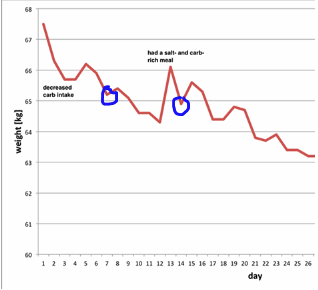
As you can see it would still show she had only lost about a 1/2 lb. She’d probably scream!
THE SOLUTION – WEEKLY AVERAGING
If seeing the scale go down is important to you, then the best way to measure is by weighing daily and then averaging each week’s weight.
The reason for this is that it will tell you the story of what really matters, your overall trajectory. This is essential because your body fluctuates dramatically from day to day. If you measure infrequently and inconsistently, the outcome literally becomes a crapshoot.
If the woman in our example had used a weekly average approach, her scale would have told a much better story.
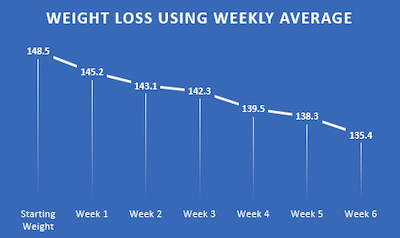
Starting Weight – 148.5 lbs
Week 1 Average – 145.2 lbs (-3.3 pounds)
Week 2 Average – 143.1 lbs (-2.1 pounds)
Week 3 Average – 142.3 lbs (-0.8 pounds)
Week 4 Average – 139.5 lbs (-2.8 pounds)
Week 5 Average – 138.3 lbs (-1.2 pounds)
Week 6 Average – 135.4 lbs (-2.9 pounds)
Total weight loss = 13.1 pounds in 6 weeks
You can see that by using a weekly average, you buffer against daily fluctuations, and get a much more honest picture of your progress.
Having the right information is critical to making good decisions.
If you’ve found yourself frustrated with the scale in the past, you might consider using this approach in the future. You’ll get a much better picture of your progress, make much better decisions, and ultimately get much better results.

